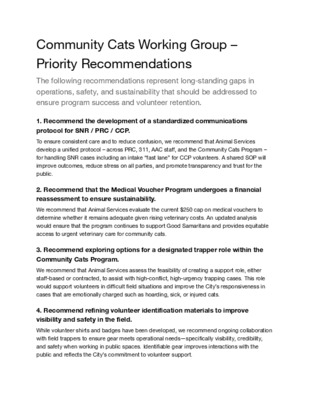Item #9 Community Cats Working Group – Priority Recommendations — original pdf
Backup

Community Cats Working Group – Priority Recommendations The following recommendations represent long-standing gaps in operations, safety, and sustainability that should be addressed to ensure program success and volunteer retention. 1. Recommend the development of a standardized communications protocol for SNR / PRC / CCP. To ensure consistent care and to reduce confusion, we recommend that Animal Services develop a unified protocol – across PRC, 311, AAC staff, and the Community Cats Program – for handling SNR cases including an intake “fast lane” for CCP volunteers. A shared SOP will improve outcomes, reduce stress on all parties, and promote transparency and trust for the public. 2. Recommend that the Medical Voucher Program undergoes a financial reassessment to ensure sustainability. We recommend that Animal Services evaluate the current $250 cap on medical vouchers to determine whether it remains adequate given rising veterinary costs. An updated analysis would ensure that the program continues to support Good Samaritans and provides equitable access to urgent veterinary care for community cats. 3. Recommend exploring options for a designated trapper role within the Community Cats Program. We recommend that Animal Services assess the feasibility of creating a support role, either staff-based or contracted, to assist with high-conflict, high-urgency trapping cases. This role would support volunteers in difficult field situations and improve the City’s responsiveness in cases that are emotionally charged such as hoarding, sick, or injured cats. 4. Recommend refining volunteer identification materials to improve visibility and safety in the field. While volunteer shirts and badges have been developed, we recommend ongoing collaboration with field trappers to ensure gear meets operational needs—specifically visibility, credibility, and safety when working in public spaces. Identifiable gear improves interactions with the public and reflects the City’s commitment to volunteer support. 5. Recommend evaluating options for a mobile-friendly volunteer coordination and request tracking system. We recommend exploring tools that allow volunteers to access trapping requests and log activity through a secure, mobile-accessible platform. The current system depends on static spreadsheets and informal coordination, which creates risk and reduces program resilience. A mobile-accessible system would improve response times and create transparency for both staff and volunteers in the field.